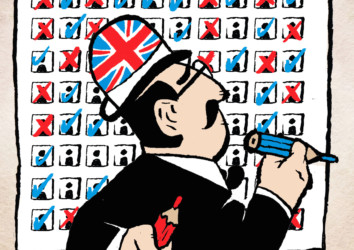
From the outset, and since the atrocities viciously committed by Osama Bin Laden’s Al Qaida — killing no less than 3,000 innocent people in the airborne assaults of September 11, 2011, on the World Trade Centre in New York and the Pentagon in Washington D.C. — most western politicians almost collectively reach the wrong conclusion when attempting to explain differences between Islam and jihad or faith and religion.
Almost everywhere in the West, and certainly in the United Kingdom and France, where it is more evident, this political formula continuously creeps up whenever a hostage is mercilessly murdered.
Most recently, UK Home Secretary, Theresa May, made a similarly ambiguous statement. Addressing the annual Conservative Party in Birmingham earlier in the month, she referred to a Quranic text that states that there was no “compulsion in religion”, (in Arabic: La Ikraha fi Al Deen).
She went on to explain: Let the message go out and let it be clear “that we know Islam is a religion of peace and it has nothing to do with the ideology of our enemies”.
Unfortunately, the predicament that most of the western world is currently facing is that it is, asking the wrong questions.
The question really is not whether Islam is a peaceful religion or Muslims are mostly moderate, as we are repeatedly reminded, but why extremists do exist within such peaceful and moderate religion? Furthermore, the more specific question, when the issue comes closer to home, should be what are western governments and local authorities doing about it and how are they dealing with it? Why a young British girl of 15, Yusra Hussain from Bristol, would choose to secretly leave fun-loving and forward-looking Britain to live in the culturally dark-age Daesh?
Nobody has come up with any serious explanation apart from scattered attempts in the media. Of course, Secretary May is not the first western official to make such patronising postures and most certainly she will not be the last. Her boss, British Prime Minister David Cameron, has previously made similar statements. Former prime minister and now the Middle East envoy, Tony Blair, also expressed similar views on the issue earlier this year. He considers the phenomena as “a perversion of faith” and the perpetrators are people “motivated by an abuse of religion”.
In fact, what Blair is saying is in itself an abuse of common sense. Who is he to pass judgement on Muslim behaviour and decide who is a “good” or a “bad” Muslim? Of course, it is not surprising for such statement to come from a man who openly declares that his decision to go to war in Iraq was somehow “Godly” and was inspired by his Christian faith.
Blair, who converted to Catholicism in December 2007, said in an interview then on ITV about his decision to go to war that he eventually “will be judged by God”.
This is seriously problematic. Neither Blair nor May, or anyone else for that matter, has got the right to decide who is a “good” or “bad” Muslim. This is the wrong approach to understand Islam and to engage with the West’s Muslim citizens. It is absolutely alarming to see that an estimated 500-600 British Muslims, mostly young and some in their teens, with about 60-70 women, joining the terrorists in the cuckoo land of the so called Daesh. Its recruits come from various countries in Europe, US, as well as Arab countries.
Shocking number of Tunisians
France alone supplies about 1,700 of its young Muslim citizens, among them a number of entire families. The Economist reported in June 2014 that there were about 3,000 Europeans among 8,000 Daesh fighters in North Syria and East of Iraq alone. Nearly a thousand have arrived from Chechnya. It has been reported that a Chechen leader, Abu Omar Al Chichani, for instance, was installed as commander of the Daesh’s northern sector in Syria in 2013.
The New York Times reported last month that there were more than 100 Americans among Daesh foreign fighters. But, surprisingly shocking is the number of Tunisian recruits, which is the highest among foreigners. This is a country that has presented itself to the region as secular and modern and implemented Hijab-free society in the early years of independence. Their number is estimated at 3,000, more than any other nation. Non-Arabic speaking Muslims in Daesh tend to be selected to join the suicide units for their lack of any other skill.
The Islamist terrorists are not new in the West and their number has been growing for many years since the 1980s under different guises, but governments and local authorities have never paid any serious attention. In fact, it is the responsibility of local governments more than it is of national governments. It was until the terror events of July 7, 2005, when a multi-attack campaign against London’s transport system was launched. The attackers were all British Muslims: Born, brought up and educated in English cities. A decade has passed without learning from that lesson or providing answers to why the trend of radicalisation of British Muslims is becoming more, rather than less, acute.
Mustapha Karkouti is a former president of the Foreign Press Association, London.








